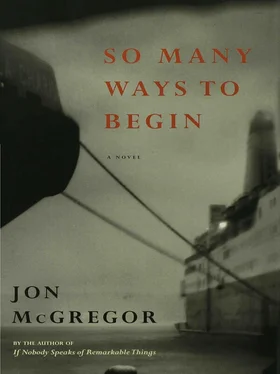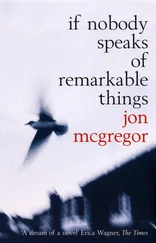Sorry, that's a bit pedantic of me, I know. What should I tell you? My Auntie Julia's not getting any better but she seems to have stopped getting worse for the time being. Mum went down to see her again this weekend and left me and Susan on our own in the house. If you think eleven o'clock's late you should see what time Susan got home1. I think she might be seeing someone she met at work but she's being very mysterious about it. I promised not to tell Mum ifshe paid my bus fare for a week, and she said that was bribery but she still agreed. On Sunday me and Danny took the train up to Birmingham -1 wanted to go to an exhibition at the Gas Hall and he wanted to see a jazz group in a pub, so we did half of each. He was asking me about you again. .
15 Picture postcard, John Lewis shipyard, Aberdeen c.1967
Eleanor's parents didn't approve. Or perhaps it wasn't as dramatic as not approving, nor as genuine; perhaps they simply didn't consider David a serious proposition. She wrote about it in her letters: he's from so far away, she told him they said, it's just not practical. He's older than you. He's not got a proper trade. He's English. She spiked these quotations with exclamation marks, as if to deflate their power, and underlined the words she most objected to: practical, proper, serious. She joked about it, sometimes, but he knew that she resented the way they felt able to interfere in her life, to set such narrow limits for her. Is that English boy still writing to you? her mother would ask, when his letters dropped on to their hallway floor and Eleanor hurried from the breakfast table to retrieve them. You should tell him to find himself a local girl, she would add scornfully.
But beneath their disapproval and scorn lay a simple fear that Eleanor's father eventually voiced one afternoon while he and David were sitting together in the kitchen. He looked at David across the table, two mugs of tea between them, and he said so when you taking her away then son? He was sitting back in his chair, but his gaze was fixed and intent, his thick eyebrows hunched darkly over his eyes. David stalled.
I beg your pardon Mr Campbell? he said, leaning forward as if he hadn't quite caught the question. Stewart Campbell didn't even blink.
You heard, he said.
Eleanor and her mother Ivy were out on the front step, talking to one of the neighbours, the neighbour doing most of the talking, Eleanor laughing occasionally, her mother keeping up a steady supply of ayes and reallys and oh-no-I-knows.
Stewart's hands were resting on the table, his fists clenched, the knuckles white. I asked when you're planning on taking Eleanor away from here, he said, laying a slow emphasis on each word. His self-contained ferocity took David by surprise. There was no shouting, no banging on the table, but for a few moments it felt as though one wrong word would bring Stewart vaulting across the table towards him. And even though he was in his late sixties by then, and often short of breath, it was obvious what a lifetime of working in the shipyards had done for the steel-rope hardness of his body. Shaking his hand had been evidence enough.
Mr Campbell, David said, trying to look him in the eye, I haven't, we haven't, really thought about that.
Stewart looked back at him, saying nothing, waiting for him to continue.
I mean, Eleanor's got her life here, David said. Her friends, her job, it wouldn't make any sense to, you know.
Aye and you'd know about that, would you? Stewart asked quickly, his voice picking up volume. You'd know all about her life here then? You want to tell me about it, do you? He leant forwards as he said it, gripping the edge of the table now, peering in at David's face as if looking for something. David could still hear Eleanor laughing outside, the sound coming through the open door. He wondered if the back door was open behind him.
But almost as quickly as Stewart's temper had flared, it softened again. He sat back, held out his palms, laid them in his lap. His face lost its pointed glare. Let me tell you something, he said, his voice calm again, distant. Let me tell you. It's not long ago, not long ago at all, that Eleanor was sitting here with her legs halfway to the floor and her chin resting on the edge of the table. David nodded and rubbed the sweat from his palms under the table. They were all that small once, Stewart said, and then before you know it they're banging their heads on the ceiling and popping out the door and that's them gone. Doesn't take long, he said. Hamish was gone before Eleanor was even born, and Eleanor will be gone soon enough.
He looked at David again, his eyes clear. But it's fine, he said. Your children grow into adults, and they leave, and they make a life of their own. It's the way the world turns, he said. He closed his eyes for a moment and eased out a loud slow breath. He lowered his head, rolled it from side to side, and looked up. But there's leaving and there's leaving, he said. You understand me? David nodded, and he knew from the look in Stewart's eyes that he hadn't meant to say all these things, and that when Eleanor asked him later what they'd been talking about he should say oh nothing much, he was just telling me about when you were small.
Ivy came back into the room, asking David if he wanted another mug of tea before he was on his way, and stopped for a moment, looking at him, looking at Stewart. Years later, David thought about the two of them in that kitchen and imagined them there when they were much younger, the children asleep in bed, both of them exhausted from a long day's work, sitting and talking while all around them wet sheets, hung from lines strung across the ceiling, steamed and dripped and swayed like storm-sodden sails; other people's laundry putting food on the table. And he imagined them sitting at that same table much later, the house empty around them, unspoken regrets and recriminations swept out of sight like crumbs from the table, silence blanketing the room, the two of them avoiding each other's eyes.
No, thank you very much, he said, standing up. That's enough tea for me, thank you Mrs Campbell. He smiled. I'll be on my way now, thank you. He glanced at Stewart briefly. Ivy stepped aside to let him pass, and he walked down the hallway and out into the sunshine, where Eleanor was waiting for him.
And as his visits became more frequent, their letters to each other became less guarded, their thoughts less veiled. They began to make half-serious suggestions about one day living not so far apart. They said that they missed each other, and thought about each other as they were going to sleep. They told each other more, much more, about their lives and their families and their secrets. And after he'd been there half a dozen times, and after they'd written maybe a hundred letters and postcards between them, she wrote this at the end of a short note she sent, almost as an afterthought, almost as if she thought he might not notice: You could come up again the weekend after next. My parents are away to Glasgow and Donald and Ros will be gone as well. You could come and stay at the house. If you'd like that.
He remembered thinking, on balance, that he probably would.
16 Birth Certificate, 17 March 1945
And this was the part of the story they would most want to hear, he thought. This was where they would quieten, and lean forward, and when he'd finished they'd say so that's how it was. You know, I always wondered.
I was sitting in Auntie Julia's room at the nursing home when it happened, he was going to start by saying. My mother had gone down the corridor to get cups of tea for the three of us, and even though she was gone for a long time she still managed to be back at just the right moment, nudging the door open with her foot as she carried the tray into the room. He imagined someone leaning towards him as he said it, as they realised what he was talking his way towards.
Читать дальше
Конец ознакомительного отрывка
Купить книгу











